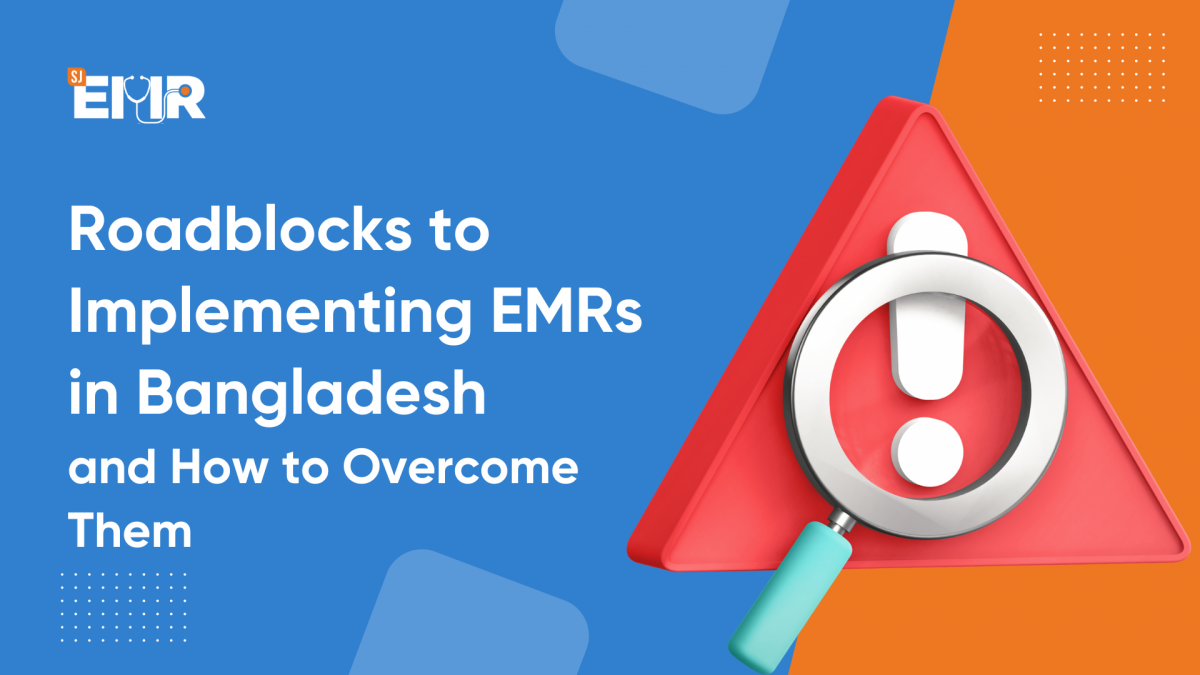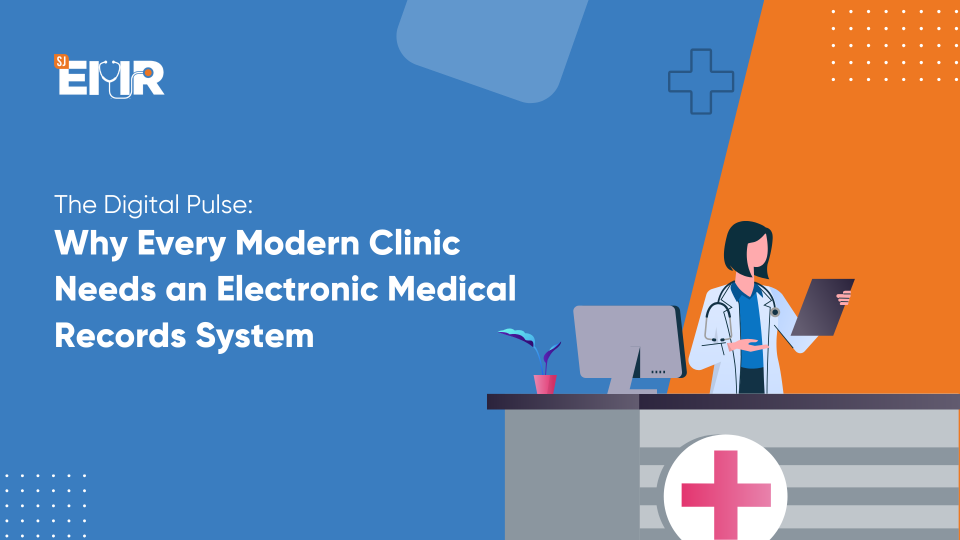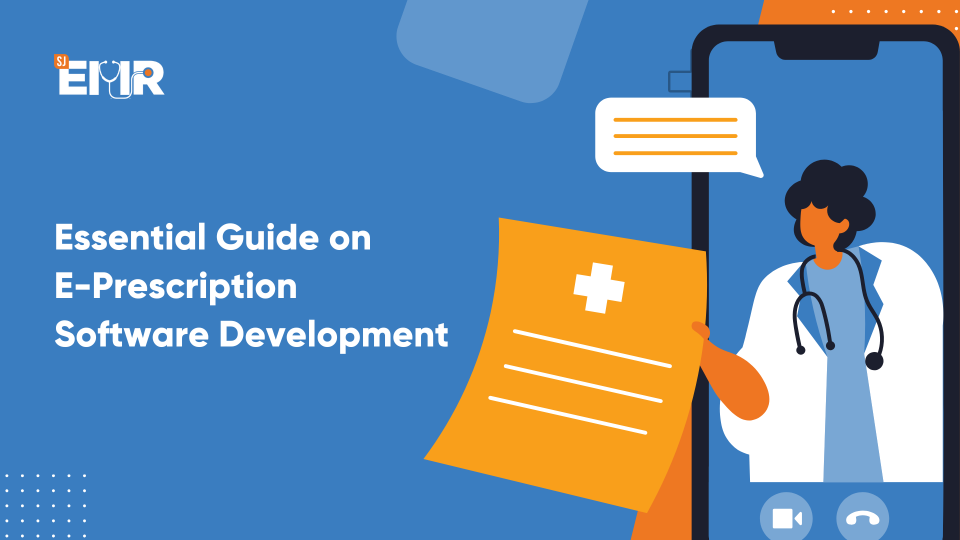Roadblocks to Implementing EMRs in Bangladesh and How to Overcome Them

From Paper-based to Digital: How Bangladesh is Modernizing its Medical Records System
August 30, 2023
Navigating the Digital Shift: Balancing EMR Use with Patient-Centered Care
December 21, 2023e-Health brings with it a lot of promise. It opens up avenues for enhancing healthcare quality, availability, and affordability in developing nations. Within Bangladesh, in particular, there is a lot of progress in integrating information and communication technology into healthcare and e-health. However, even as a collaborative effort between the public and private sectors has been instrumental in nurturing the growth of the e-health infrastructure across the nation, there are still concerns and challenges of EMR implementation. Let’s look at some of these roadblocks to EMR implementation in Bangladesh and how to overcome them.
Why Bangladesh Needs to Maintain EMRs?
To give you a glimpse into why electronic medical records in Bangladesh are a must…
Ishrat Binte Aftab, a Research Associate at James P Grant School of Public Health, BRAC University wrote, “A few years back, I had the opportunity to work as a research assistant on a breast cancer project. This role gave me an up-close look at the experiences of cancer patients at the National Institute of Cancer Research & Hospital (NICRH) in Dhaka. Coming from a more privileged socioeconomic background, I had always had relatively easy access to private healthcare facilities in Bangladesh. However, what I witnessed at NICRH left me astonished, highlighting the complexity of accessing healthcare in our country.
NICRH serves a vast number of patients daily, primarily because it offers more affordable healthcare services. Yet, despite this healthcare accessibility in Bangladesh, many individuals struggle to receive the care they need. The absence of a streamlined online appointment system forces rural patients to arrive in the early hours of the morning, sometimes before dawn, to secure a spot in line for a doctor’s consultation. Furthermore, the issue is compounded by the limited availability of services. Patients travel from remote areas only to find that there are no available slots for chemotherapy or other crucial treatments.
Adding to the complexity, elderly cancer patients often forget to bring their previous prescriptions and medical reports. Even when they manage to bring most of their documentation, they might inadvertently leave out one or two essential reports. As a result, doctors cannot provide a comprehensive evaluation of their cancer status, leading to further frustration and uncertainty.
In the past, addressing these challenges was a daunting task, particularly within the constraints of a third-world healthcare infrastructure like ours. However, with the advent and widespread use of digital software, problem-solving has become noticeably more manageable. This prompts a crucial question: at a time when the rest of the world is rapidly advancing its healthcare systems through digital innovation in healthcare, why are we still struggling to catch up?”
The Challenges of Implementing EMRs in Bangladesh and How to Overcome Them
The Healthcare Landscape in Bangladesh
Before we delve into the challenges and solutions, let’s understand the healthcare infrastructure in Bangladesh. This South Asian nation, with a population exceeding 160 million, faces unique healthcare challenges. The country grapples with issues such as high population density, limited resources, and a predominantly rural population. These factors significantly impact the healthcare sector’s ability to embrace and integrate advanced technologies like EMRs.
The Challenges of Implementing EMRs in Bangladesh
-
High Cost of Technology
There is one unavoidable reality: EMR systems come with a significant price tag. Implementing such systems requires substantial financial investments, which can strain the already resource-limited healthcare infrastructure in Bangladesh.
A Tight Budget: There are healthcare budget constraints. Bangladesh’s healthcare budget is limited, with most of it allocated to primary healthcare services. This leaves minimal room for large-scale technology investments like EMRs.
Potential Solutions:
- Government Funding for healthcare technology: The government of Bangladesh can allocate a portion of its budget or seek international aid to fund EMR implementation projects. These funds can be specifically earmarked for acquiring EMR technology and training healthcare professionals.
- Public-Private Partnerships in healthcare: Collaboration between public healthcare institutions and private sector technology providers can help offset costs. Private companies can invest in EMR systems in exchange for access to a vast patient database, which can be used for research and development.
-
Lack of Technical Expertise
The Skill Gap: Effective implementation of EMRs requires a skilled workforce proficient in managing and maintaining these systems. Bangladesh faces a shortage of professionals with technical expertise in healthcare IT
Capacity Building: To bridge this gap, the country needs comprehensive training programs that focus on technical expertise in healthcare IT. These programs should target both existing healthcare professionals and a new generation of IT specialists.
Potential Solutions:
- Training Centers: Establish dedicated training centers or partner with existing institutions to provide courses in healthcare IT. These healthcare workforce training courses should cover EMR implementation, data security, and system maintenance.
- Scholarships and Incentives: Offer scholarships and financial incentives to individuals pursuing careers in healthcare technology. This can attract young talent to the field.
-
Cultural Change in Healthcare
Resistance to Change: Implementing EMRs necessitates a shift in the healthcare culture. This is because of resistance to digital healthcare adoption. Healthcare professionals in Bangladesh may be resistant to change, especially when it comes to adopting digital practices.
Potential Solutions:
- Educational Campaigns: To foster a culture of acceptance and enthusiasm for EMRs, educational campaigns can be initiated. These campaigns should highlight the benefits of EMRs and dispel misconceptions.
- Awareness Programs: Launch extensive awareness programs targeting healthcare professionals, administrators, and patients. These healthcare awareness campaigns and programs should emphasize how EMRs can enhance patient care, reduce errors, and streamline healthcare processes.
- Pilot Projects: Initiate small-scale EMR pilot projects in select healthcare facilities. Demonstrate the positive impact of EMRs on patient outcomes and efficiency to encourage broader adoption.
Initiatives to Overcoming EMR Implementation Barriers
While the challenges are significant, Bangladesh is not standing idly by. Several initiatives are underway to tackle these issues head-on and unlock the potential of EMRs in the country.
-
Government Initiatives
The government of Bangladesh recognizes the importance of EMRs in improving healthcare delivery. It has initiated programs to allocate resources and build infrastructure for the implementation of EMRs in public healthcare facilities.
-
International Collaboration in Healthcare
Bangladesh is partnering with international organizations and governments to seek funding and expertise for EMR projects. These collaborations aim to bridge the financial and knowledge gaps.
-
Training Programs
Numerous institutions and organizations are rolling out training programs to equip healthcare professionals with the necessary skills for EMR adoption. These programs are designed to ensure that the workforce is ready to embrace digital healthcare.
Conclusion: Charting the Path Forward
Implementing EMRs in Bangladesh is undoubtedly a formidable challenge, but it’s a challenge that must be met to usher in a new era of healthcare efficiency and improved patient outcomes. The government, in collaboration with international partners, is taking steps to overcome financial barriers. Training programs for patient care improvement through EMRs are equipping the healthcare workforce with the skills needed to manage EMRs effectively. And awareness campaigns are working to change the culture of healthcare in the country.
As these initiatives continue to progress, the vision of a Bangladesh with a robust and efficient EMR system is drawing closer. With persistence, collaboration, and a shared commitment to better healthcare, the challenges of implementing EMRs in Bangladesh can be overcome, ultimately benefiting healthcare efficiency and patient outcomes in Bangladesh.
Remember, unlocking the potential of EMRs is not just a technological leap; it’s a leap toward a healthier Bangladesh!




